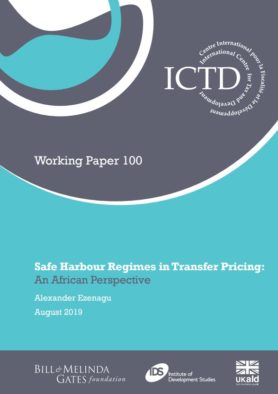Working Paper 100
Applying transfer pricing rules in Africa poses great difficulties. There are few reliable comparables to benchmark prices and terms fixed by related entities in their transactions with each other. This means that jurisdictions struggle with applying the arm’s length principle in intra-firm dealings, as prescribed by tax treaties and domestic laws. Furthermore, the requirement for an individual facts and circumstances analysis in transfer pricing promotes subjectivity in transfer pricing audit and administration. This subjectivity creates an environment of uncertainty for taxpayers and potential investors, who find it hard to predict tax outcomes. In addition, the requirement for individual facts and circumstances analysis in transfer pricing is resource-intensive, time-consuming and complex to implement for all – especially the tax authority, who is in competition with large accounting firms to arrive at an appropriate tax return for the taxpayer. This is where safe harbour regimes may be useful. Safe harbour regimes are established to reduce the burden of tax compliance and ease administration of the tax system, while at the same time providing tax certainty. For taxpayers subject to transfer pricing rules of taxing jurisdictions, safe harbour regimes have the potential to reduce the compliance burden involved in establishing an arm’s length price for transactions entered into with related entities. For tax authorities, safe harbour regimes can help to ensure effective management of limited resources needed for tax enforcement. Finally, they may be used to secure and increase corporate income tax of taxing jurisdictions. Both the OECD Transfer Pricing Guidelines for Multinational Enterprises and Tax Administrations (OECD TPGs) and the UN Practical Manual on Transfer Pricing for Developing Countries (UN Practical Manual) recommend the application of safe harbour regimes to small- and medium-sized enterprises (SMEs) and small transactions, which are deemed to carry low tax risk, though creating significant compliance and enforcement burdens on taxpayers and tax authorities, respectively. The guiding reasons for introducing safe harbour regimes for rich countries are to reduce the compliance costs and burden for taxpayers, and enforcement burden for tax authorities. For African countries, increasing and guaranteeing corporate income tax collection is equally important. Appreciating this additional policy objective can help the effective introduction and design of appropriate safe harbour regime(s) for African countries. This paper makes the case for the cautious introduction and use of safe harbours by tax authorities in African countries, to achieve increased revenue collection, tax efficiency, certainty, simplicity, convenience, and to circumvent complicated comparability analysis.
Read the 2-page brief version here.

